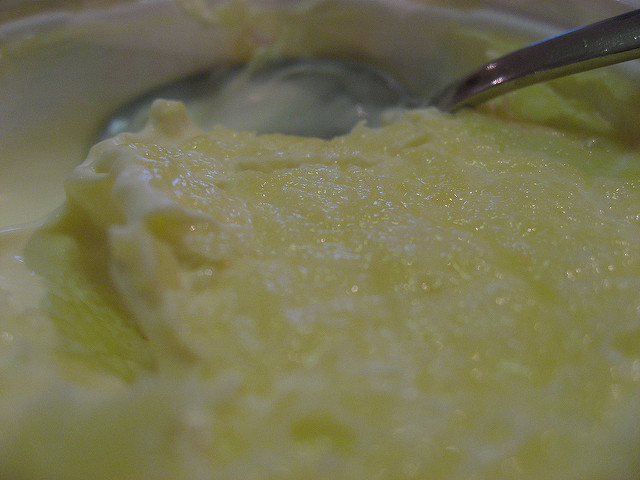Do You Know What Kashta Is? Posted by jesa on Jul 18, 2017 in Arabic Language, Culture, Grammar
Marhaba! If you have ever tasted a range of Arabic sweets and come across a creamy white ingredient that you thought tasted like heaven, then you have encountered Kashta (or Ashta as pronounced in some dialects, قشطة )! Found in most sweets such as Knefe (كنافة), Katayif (قطايف), and Znood el-Sir (زنود الست), Kashta is a filling much like clotted cream, made of dairy, and sometimes in the Levantine way, made with rose water.
Today, I want to share with you the ingredients and method to prepare this tasty filling so you can use it for making your favorite deserts or simply used it on top of a fruit salad or cocktail.
Ingredients (المكونات):
3 cups whole milk (حليب كامل الدسم)
3 cups milk with cream, meaning half and half (حليب مكثف)
½ tablespoon orange blossom water (ماء الزهر)
½ tablespoon rose water (ماء الورد)
½ lemon squeezed
¼ tablespoon of sugar
Method of Preparation (طريقة التحضير):
Boil the milk and the cream (half and half), stirring constantly.
Add the sugar.
Add the lemon juice to the boiling milk. The mixture will start to clot.
Continue by adding the orange blossom and rose water.
Once you mixture has clotted well, use a strainer spatula to collect your clots and place them in a side dish. Continue doing that until you have a good amount of collected clotted cream, and there is your Kashta!
Cool to room temperature to serve or use in pastry. Do not forget to refrigerate remainder since Kashta is perishable.
Enjoy!
For now take care and stay tuned for upcoming posts!
Happy Learning!
Have a nice day!!
نهاركم سعيد

Build vocabulary, practice pronunciation, and more with Transparent Language Online. Available anytime, anywhere, on any device.




